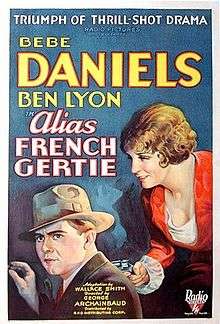Alias French Gertie
Alias French Gertie is an American Pre-Code crime film directed by George Archainbaud, with a screenplay by Wallace Smith, based upon the unproduced play, The Chatterbox by Bayard Veiller. It stars Bebe Daniels and Ben Lyon, who were making their first on-screen appearance together.[3] A copy of this film survives in the Library of Congress.[4]

| Alias French Gertie | |
|---|---|
 Film poster | |
| Directed by | George Archainbaud[1] |
| Produced by | Henry Hobart[2] |
| Screenplay by | Wallace Smith[2] |
| Based on | The play, The Chatterbox by Bayard Veiller[2] |
| Starring | Bebe Daniels Ben Lyon[2] |
| Cinematography | J. Roy Hunt[3] |
Production company | |
Release date |
|
Running time | 66 minutes[3] |
| Country | United States |
| Language | English |
Plot
Marie is a jewel thief; posing as French maid, she has cased out the safe of her employer and intends to steal its contents. However, the night she chooses for the robbery, there is another thief who also shows up to empty the safe, Jimmy. Jimmy opens the safe, and the two agree to split the contents fifty-fifty. They are interrupted by the arrival of the police. Jimmy gallantly secretes Marie away, and takes the rap himself, impressing her.
After serving his year's sentence, Jimmy is reunited with Marie, who now goes by the alias of Gertie, and the two form a partnership in crime. After several bank robberies, Marie and Jimmy agree that after one last haul, they will go straight. Marie, who has become friends with the next-door neighbors in her apartment building, Mr. and Mrs. Matson, who entice Jimmy to invest his $30,000 savings in Matson's business. Unfortunately, the Matsons turn out to be crooks themselves, and have swindled Jimmy out of his life's savings.
When Jimmy determines to go back to safecracking, beginning with Marie's former employers, Marie hatches a plot to encourage him to go straight. When a good-hearted detective, Kelcey, lets them off the hook with the promise that they will go straight, they agree.
Cast
- Bebe Daniels as Marie
- Ben Lyon as Jimmy
- Robert Emmett O'Connor as Kelcey
- John Ince as Mr. Matson
- Daisy Belmore as Mrs. Matson
- Betty Pierce as Nellie
- Nella Walker as Morton's Wife
Reception
The New York Times critic, Mordaunt Hall, gave the film a lukewarm review, praising the acting of Bebe Daniels, while not being as kind to Ben Lyon. Overall, he said the film, "... has not been handled with the subtlety and smoothness it deserves. Nevertheless, up to a certain point, it is a production that holds the interest, but what should have been the main idea is sacrificed for a more obvious turn of events."[5]
Notes
This is the first film in which Bebe Daniels and Ben Lyon co-starred. They were married a short time afterwards, in June 1930, and the two remained married until her death in 1971.[3][6] The play from which this screenplay was adapted, The Chatterbox, does not appear to have ever been produced.[2]
The film was a remake of the 1925 FBO silent film, Smooth as Satin, starring Evelyn Brent and Bruce Gordon, and directed by Ralph Ince.[7]
References
- "Alias French Gertie: Technical Details". theiapolis.com. Retrieved June 23, 2014.
- "Alias French Gertie, Credits". Turner Classic Movies. Archived from the original on June 23, 2014. Retrieved June 23, 2014.
- "Alias French Gertie: Detail View". American Film Institute. Archived from the original on June 23, 2014. Retrieved August 24, 2016.
- Catalog of Holdings The American Film Institute Collection and The United Artists Collection at The Library of Congress page 4, c. 1978 by The American Film Institute
- Hall, Mordaunt (April 14, 1930). "Alias French Gertie: Safe Crackers". The New York Times. Archived from the original on June 23, 2014.
- Donnelley, Paul (2003). Fade to Black: A Book of Movie Obituaries. Music Sales Group. p. 191. ISBN 0-711-99512-5.
- Jewell, Richard B.; Harbin, Vernon (1982). The RKO Story. New York: Arlington House. p. 26. ISBN 0-517-546566.
External links
- Alias French Gertie at, imdb.com
- Film Synopsis at AllMovie